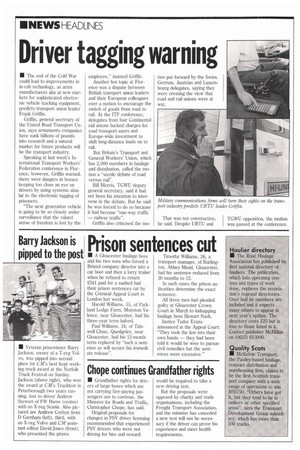Driver tagging warning
Page 8

If you've noticed an error in this article please click here to report it so we can fix it.
• The end of the Cold War could lead to improvements in in-cab technology, as arms manufacturers aim at new markets for sophisticated electronic vehicle tracking equipment, predicts transport union leader Frank Griffin.
Griffin, general secretary of the United Road Transport Union, says armaments companies have sunk billions of pounds into research and a natural market for future products will be the transport industry.
Speaking at last week's International Transport Workers' Federation conference in Florence, however, Griffin warned, there were dangers in bosses keeping too close an eye on drivers by using systems similar to the electronic tagging of prisoners.
"The next generation vehicle is going to be so closely under surveillance that the valued sense of freedom is lost by the employee," insisted Griffin.
Another hot topic at Florence was a dispute between British transport union leaders and their European colleagues over a motion to encourage the switch of goods from road to rail. At the ITF conference, delegates from four Continental rail unions backed charges for road transport users and Europe-wide investment to shift long-distance loads on to rail.
But Britain's Transport and General Workers' Union, which has 2,000 members in haulage and distribution, called the motion a "sterile debate of road versus rail".
Bill Morris, TGWU deputy general secretary, said it had not been his intention to intervene in the debate. But he said he was forced to do so because it had become "one-way traffic — railway traffic".
Griffin also criticised the mo
tion put forward by the Swiss, German, Austrian and Luxembourg delegates, saying they were creating the view that road and rail unions were at war.




















































































